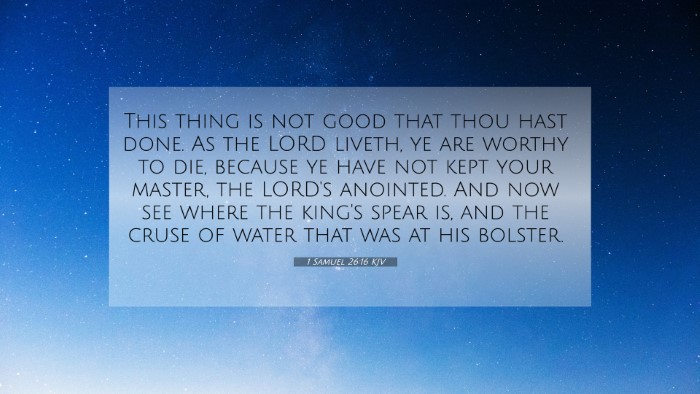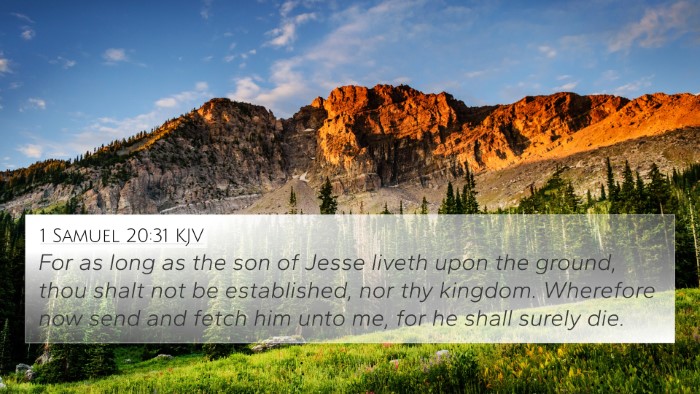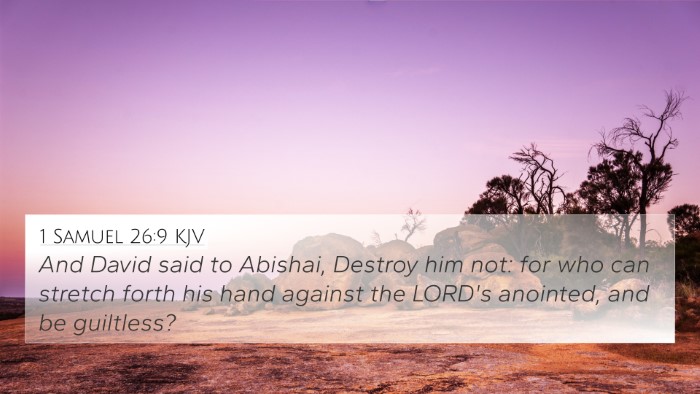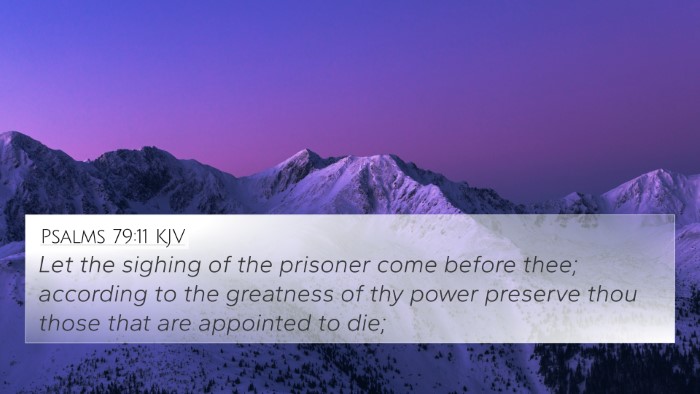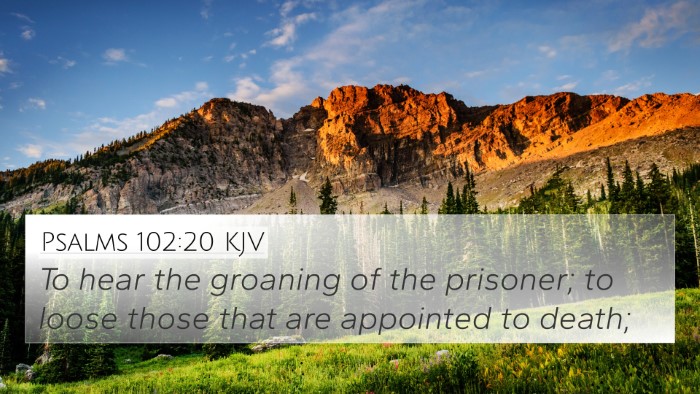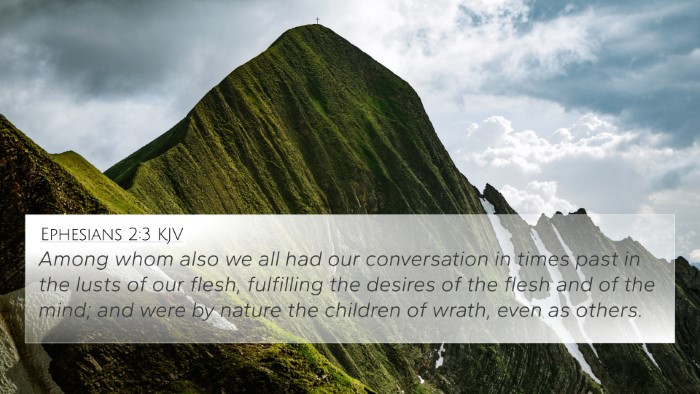Understanding 1 Samuel 26:16
Bible Verse: 1 Samuel 26:16 (KJV) - "This thing is not good that thou hast done: as the Lord liveth, ye are worthy to die, because ye have not kept your master, the Lord's anointed. And now see where the king's spear is, and the cruse of water that was at his bolsters."
Summary of the Verse Meaning
The events captured in this verse highlight the critical moment when Abner, the commander of Saul's army, is confronted by David. David had just spared Saul’s life, showcasing a clear act of mercy, but he draws attention to the failure of those entrusted with the protection of God's anointed king. The core message revolves around the royal duty, respect for God's anointed leaders, and the consequences of neglecting such a sacred duty.
Commentary Insights
Matthew Henry's Commentary
Henry emphasizes the gravity of the situation, suggesting that the preservation of life, even that of enemies, reflects righteousness. By addressing Abner with a tone of disappointment, he points out that true loyalty to one’s king requires vigilance and dedication to their safety. In this moment, David exemplifies the moral high ground, while Abner's oversight reveals a potential for failure in leadership.
Albert Barnes' Notes
Barnes relates this incident to themes of loyalty and responsibility. He critiques Abner's negligence and underscores the serious implications of such oversight, especially when it concerns the king, who is seen as chosen by God. The verse serves as a reminder of the consequences of failing to protect and respect those in divinely appointed positions.
Adam Clarke's Commentary
Clarke provides context by exploring the relationships between the key players in this narrative. He notes that David's conversation with Abner is both an indictment and a teaching moment. The call to recognize the value of divine appointment is a reminder of the seriousness with which God's authority must be treated, reinforcing the need for steadfast commitment and action in defense of such authority.
Bible Cross-References
This verse connects with several important scriptures that can aid in a deeper understanding through comparative analysis. Here are some relevant cross-references:
- 1 Samuel 24:6: "And he said unto his men, The Lord forbid that I should do this thing unto my master, the Lord's anointed, to stretch forth mine hand against him, seeing he is the anointed of the Lord." - Highlights David's respect for God's anointed.
- 1 Samuel 12:3: "Here I am: witness against me before the Lord, and before his anointed: whose ox have I taken? or whose ass have I taken? or whom have I defrauded? whom have I oppressed? or of whose hand have I received any bribe to blind mine eyes therewith? And I will restore it you." - Reflects on the character of leadership.
- 2 Samuel 1:14: "And David said unto him, How wast thou not afraid to stretch forth thine hand to destroy the Lord's anointed?" - Further reiterates David's perspective on the anointed king.
- Romans 13:1: "Let every soul be subject unto the higher powers. For there is no power but of God: the powers that be are ordained of God." - Emphasizes God's sovereignty over leaders.
- 1 Chronicles 16:22: "Saying, Touch not mine anointed, and do my prophets no harm." - Reminds us of the protection over God's anointed ones.
- Psalm 105:15: "Saying, Touch not mine anointed, and do my prophets no harm." - A reaffirmation of God's warning regarding His chosen leaders.
- Hebrews 13:17: "Obey them that have the rule over you, and submit yourselves: for they watch for your souls, as they that must give account..." - Stresses the importance of supporting leaders.
Thematic Connections and Interpretive Reflections
The intersection of themes found in 1 Samuel 26:16 with other biblical texts consists of profound teachings about authority, respect for divine appointment, and community accountability. Such connections can serve as a guide in our spiritual practices and real-life applications.
Tools for Bible Cross-Referencing
Engaging in cross-referencing allows believers to explore the cohesive narrative of Scripture. Here are some methods and tools to facilitate this:
- Bible Concordance: A comprehensive tool that organizes words and phrases found in the Bible, aiding in locating scriptures related to core themes.
- Bible Cross-Reference Guide: Specialized resources that highlight linked verses and themes across different books of the Bible.
- Cross-Referencing Bible Study: Techniques that involve thematic grouping of verses to uncover deeper meanings.
- How to Use Bible Cross-References: Engaging with various texts to identify parallels and contrasts to expand understanding.
- Bible Reference Resources: Libraries or online tools that compile references for spiritual studies.
Practical Applications of Cross-Referencing
Cross-referencing can be particularly beneficial in sermon preparation, personal study, and group discussions. By tracing themes and teachings, believers can gain insightful perspectives that enrich their faith journey. The process strengthens one’s ability to see how interconnected God’s Word truly is.
In conclusion, 1 Samuel 26:16 invites believers to consider the importance of faithfulness in leadership roles and the dignity bestowed upon God's anointed. Exploring cross-references enhances our understanding of biblical principles that govern our interactions with divinely appointed leaders.


